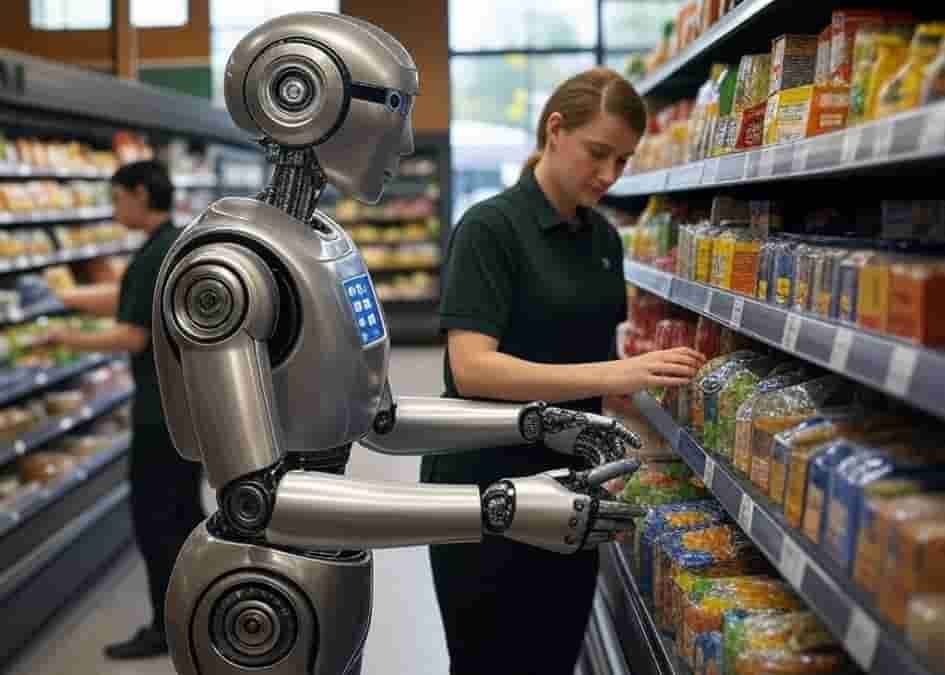The familiar routine of pushing a trolley down the supermarket aisle may soon feel a little different – especially for Morrisons customers in Wetherby, Redcar, and Stockton. In a UK first, the national retailer has introduced human-sized robots named Tally, designed to roam the aisles autonomously, collecting real-time data on stock levels and shelf accuracy.
Developed by US-based tech firm Simbe Robotics, Tally stands at 5ft 4in – the same height as the average UK woman – and has already been deployed in nine countries, including Germany, Portugal and France. Shoppers encountering the robot describe it as surprisingly agile, programmed to avoid collisions with customers and trolleys.
Tally’s UK arrival signals Morrisons’ latest foray into advanced retail automation in the workplace, joining a growing list of supermarkets trialling AI and work to help boost efficiency and improve the shopping experience. The robot can scan shelves for pricing errors, out-of-stock items and misplaced products, all while operating without human intervention. However, what truly caught shoppers off guard was its ability to respond when asked for product locations – a touch of human utility in a robotic frame.
Seamus McHugh, head of European market development at Simbe, shared his enthusiasm on LinkedIn, stating he was “delighted” to see the company’s solution implemented in Morrisons. He further emphasised the robot’s proven track record, referencing its successful launch across major European markets and in US grocery chain Tops.
Customer experience or cause for concern?
The deployment of robots in everyday retail spaces inevitably invites both fascination and scepticism. While Morrisons has positioned Tally as a tool to relieve staff of repetitive tasks — allowing human UK retail sales workers to concentrate on delivering better customer service — some shoppers have voiced apprehension.
Several customers took to social media, calling the rollout “dystopian” and lamenting the slow erosion of human interaction in high street retail. One user on X (formerly Twitter) said: “Nope, we DO NOT WANT THESE IN OUR SHOPS. I would always go to a till with a person, having a small chat with them and asking how they are doing – everyone has a bad day – can’t do that with a computer.”
Others raised broader questions about the long-term impact of such technology on traditional job roles with some UK workers being optimistic about adapting to AI and technology changes in the workplace
While Morrisons maintains that Tally enhances operational accuracy rather than replacing people, the broader trend across the UK grocery sector suggests a steady pivot toward tech-enabled solutions.
Recent innovations from Sainsbury’s and M&S reinforce this trajectory. Last year, Sainsbury’s launched hybrid self-checkouts equipped with conveyor belts and built-in bagging areas, aimed at speeding up the checkout process. Meanwhile, in early 2025, M&S began trialling smart checkouts capable of calculating totals with no need for manual scanning — promising seamless transactions with minimal human input.
Balancing efficiency and empathy in retail
The UK supermarket industry appears to be at a crossroads: balancing technological efficiency with the human touch many customers still value. Automation, once limited to stock rooms and supply chains, is now walking the shop floor, guiding shoppers and scanning shelves. But the human side of the weekly shop — the friendly greetings, casual conversations, and problem-solving interactions — remains an integral part of the experience for many.
The Workers Union Says…
“What’s clear is that the use of robotic assistants like Tally will continue to evolve, with retailers closely monitoring public reaction. If customer satisfaction improves and operational performance follows, it’s likely more stores across the UK will welcome their own version of Tally. Yet, with every new digital step forward, the retail sector must also answer to the public’s desire for compassion, job security and conversation — qualities no algorithm can yet replicate.”




